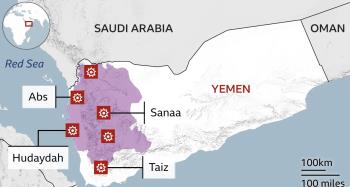Alwaght- American media reported that President Joe Biden on April 23 told his Turkish counterpart Recep Tayyip Erdogan he was planning to recognize as "genocide" the massacring in 1915 of the Armenians by the Ottoman Empire from whose ashes was born the modern Turkey.
The news followed other news published last week about the US kicking Turkey out of the F-35 stealth fighter jet production program.
The massacring of the Armenians under the Ottoman rule has been up for debate since the First World War. However, with Turkey allied to the US-headed Western camp in the past years, Biden predecessors never used the term of "genocide" for the mass killings by the Ottoman forces despite pressure from various sides.
In recent years, the relations between Washington and Ankara went frayed but Biden's predecessor Donald Trump even actively sought to prevent the recognition of the "genocide" of Armenians in the US Congress. Barack Obama never used the word during his eight years in office, despite the demands of many of his orbit figures, and instead referred to events by the Armenian term "Metz Yeghern", meaning great evil.
On Saturday, Biden stopped the established shy-away policy and approved the Congress labeling. This move promotes some questions: Why has Biden recognized the genocide in the current conditions? What consequences could this US government's move have on the relations with Ankara?
The Armenian genocide and Turkish defenses
The Armenian genocide refers to a series of acts and massacres committed against Armenians during three years by the Ottoman Empire in various ways. Armenia has always insisted that the actions of the Ottoman Empire at that time killed 1.5 million Armenians. Between 1915 and 1917, these people were the victims of planned massacres, forced migration and starvation, Yerevan argues. According to this claim, during WWI, the Ottomans systematically persecuted and murdered the Armenians. However, there is no consensus among political observers and historians on the issue. Some historians speak of hundreds of thousands killed and some even put the number of victims at 1.5 million.
So far, over 30 countries have recognized as genocide the mass killings. First recognizer was France as a big European power, in 2001. The German parliament followed in France's footstep in 2016, triggering Ankara-Berlin diplomatic crisis. The US recognition came in December 2019 by the Congress, though Trump administration steered clear of its approval.
Although the number of countries recognizing the Armenian genocide is growing day by day, Turkish officials have denied the genocide in all the decades since the formation of the modern Turkey in 1924, stressing that what happened was just part of the WWI incidents. While acknowledging such a massacre took place at the hand of the Ottoman Empire, the Turkish government does not see it a systematic crime and reacts severely to describing it as genocide.
Why did Biden approve the Congress labeling?
Despite all the opposition expressed by Turkey, the White House's recognition of the Armenian genocide now seems closer to reality than ever. Three main goals seem to drive this recognition:
Breaking Erdogan-Trump game rules: Former US president During Trump, due to personality closeness to Erdogan and perhaps personal business ties to Ankara, never went tough on Turkey despite push from the Congress to press the Turkish government.
Even on December 12, 2019, when the US Congress voted to condemn the Armenian genocide, Trump easily resisted the demands of lawmakers and refused to recognize the genocide in order to maintain relations with Erdogan. But now with the change of president, the Americans seem to have changed their minds as well, and Biden intends to destroy the legacy of Erdogan and Trump relationship under the pretext of defending human rights. The reality is that it has been proven time and again that human rights in the US administration have always been an instrument for serving US political interests. Biden's recent remarks are no exception.
Turkish trouble-making for NATO and pushing to maintain Ankara
Another motivation for Biden's step is driven by his departure from Trump’s era negative vision of Europe and efforts to revive NATO strength and bridge member gaps. Over the past four years, Turkey became a headache for the North Atlantic Treaty Organization, playing its own game and having maximal confrontation with other members of the military bloc. Trump turned a blind eye to this Turkish approach. Actually, a large part of the Trump indifference to the Turkish harassment of Greece and other European states in the Mediterranean was encouraged by Europe falling out of favor with the US under Trump. For Trump, even NATO as the key Western military alliance was not a priority, as he kept all the time complaining about Europe not paying a fair share in the bloc's budget. As a result, Trump was uninterested to enter the Turkish-European rifts and even he clandestinely perhaps assured Erdogan about freedom to escalate tensions with the Europeans in the Mediterranean. These tensions went so far that France demanded the expulsion of Turkey from the NATO.
Nevertheless,, things have changed now. Commencing his presidency with promising to mend traditional alliance with Europe and commit to the Atlantic area, Biden cannot stay silent regarding Turkey. This, certainly, strengthens prospects of Biden pressure on Turkey to avoid more adventures in the Mediterranean and rivalry against the European countries. Therefore, recognition of the Armenian genocide is a path to implement this approach.
Seeking to oust Erdogan from power
Biden is personally antipathetic to Erdogan, as his interview in 2019 showed. In an interview with the New York Times, two years ago Biden called Erdogan an "authoritarian" leader and asked the US help to his opposition to oust him from power. As much as the foreign policy would be a challenging matter in the US-Turkey relations under Biden, internal Turkish issues can be a challenge for Erdogan's ties to Biden's White House. Human rights and the Kurds are two sensitive issues for Biden administration with potentials to trigger interventionist reactions by Washington officials.
With these in mind, Biden's Armenian genocide recognition should serve as an instrument for increasingly impairing Erdogan at home. This approach plays into the hands of the Turkish opposition that would propagate the chill in ties with the US as a strategic mistake of Erdogan and the ruling Justice and Development Party (AKP), all to prepare the ground for victory in the next elections.
What are the implications?
Biden's move will probably have diplomatic consequences, but no legal ones to Turkey. The most important and tangible outcome will be downturn of the Washington military and economic cooperation with Ankara. The crises caused by the Turkey's purchase of the long-range Russian S-400 air defenses, Turkish attacks on the Kurds in northern Syria, and its failure to coordinate its actions and policies with the major NATO policies in West Asia will impact negatively their bilateral trade, security, and military cooperation.



























